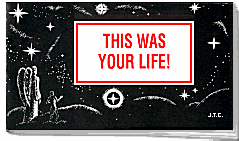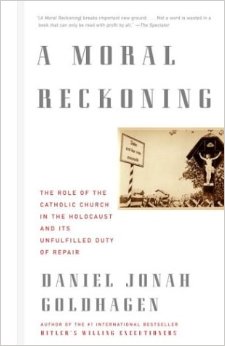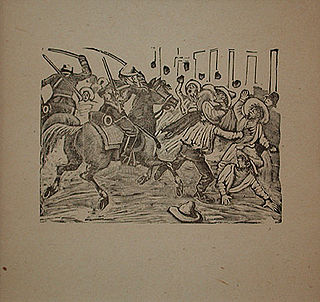The term "recovering Catholic" is used by some former practicing Catholics to describe their religious status. The use of the term implies that the person considers their former Catholicism to have been a negative influence on their life, [1] one to be "recovered" from. [2] The term first came into use in the 1980s. [3]
The term is sometimes used with humorous intent, [4] with a conscious parallel being drawn to the 12-step recovery programs often used by those recovering from addictions, [5] although practicing Catholics often find the term offensive. [6]

Christianity is an Abrahamic monotheistic religion based on the life and teachings of Jesus. It is the world's largest and most widespread religion with roughly 2.4 billion followers, comprising around 31.2% of the world population. Its adherents, known as Christians, are estimated to make up a majority of the population in 157 countries and territories. Christians believe that Jesus is the Son of God, whose coming as the Messiah was prophesied in the Hebrew Bible and chronicled in the New Testament.

Anglo-Catholicism comprises beliefs and practices that emphasise the catholic heritage and identity of the various Anglican churches.

A new religious movement (NRM), also known as alternative spirituality or a new religion, is a religious or spiritual group that has modern origins and is peripheral to its society's dominant religious culture. NRMs can be novel in origin or they can be part of a wider religion, in which case they are distinct from pre-existing denominations. Some NRMs deal with the challenges that the modernizing world poses to them by embracing individualism, while other NRMs deal with them by embracing tightly knit collective means. Scholars have estimated that NRMs number in the tens of thousands worldwide. Most NRMs only have a few members, some of them have thousands of members, and a few of them have more than a million members.

The Catholic League for Religious and Civil Rights, often shortened to the Catholic League, is an American Catholic organization whose stated purpose is to "defend the right of Catholics – lay and clergy alike – to participate in American public life without defamation or discrimination." The Catholic League states that it is "motivated by the letter and the spirit of the First Amendment ... to safeguard both the religious freedom rights and the free speech rights of Catholics whenever and wherever they are threatened." According to the Encyclopedia of American Religion and Politics, the league "is regarded by many as the preeminent organization representing the views of American lay Catholics."
Anti-clericalism is opposition to religious authority, typically in social or political matters. Historical anti-clericalism has mainly been opposed to the influence of Roman Catholicism. Anti-clericalism is related to secularism, which seeks to separate the church from public and political life.
Clerical fascism is an ideology that combines the political and economic doctrines of fascism with clericalism. The term has been used to describe organizations and movements that combine religious elements with fascism, receive support from religious organizations which espouse sympathy for fascism, or fascist regimes in which clergy play a leading role.
The term high church refers to beliefs and practices of Christian ecclesiology, liturgy, and theology that emphasize "ritual, priestly authority, [and] sacraments". Although used in connection with various Christian traditions, the term originated in and has been principally associated with the Anglican tradition, where it describes churches using a number of ritual practices associated in the popular mind with Roman Catholicism and Eastern Orthodoxy. The opposite tradition is low church. Contemporary media discussing Anglican churches often prefer the terms evangelical to low church and Anglo-Catholic to high church, even though their meanings do not exactly correspond. Other contemporary denominations that contain high church wings include some Lutheran, Presbyterian, and Methodist churches.
A lapsed Catholic is a Catholic who is non-practicing. Such a person may still identify as a Catholic, and remains one according to Catholic canon law.

Anti-Catholicism is hostility towards Catholics and opposition to the Catholic Church, its clergy, and its adherents. At various points after the Reformation, some majority Protestant states, including England, Northern Ireland, Prussia, Scotland, and the United States, turned anti-Catholicism, opposition to the authority of Catholic clergy (anti-clericalism), opposition to the authority of the pope (anti-papalism), mockery of Catholic rituals, and opposition to Catholic adherents into major political themes and policies of religious discrimination and religious persecution. Major examples of groups that have targeted Catholics in recent history include Ulster loyalists in Northern Ireland during the Troubles and the second Ku Klux Klan in the United States. The anti-Catholic sentiment which resulted from this trend frequently led to religious discrimination against Catholic communities and individuals and it occasionally led to the religious persecution of them. Historian John Wolffe identifies four types of anti-Catholicism: constitutional-national, theological, popular and socio-cultural.

Chick tracts are short evangelical gospel tracts in a comic book format, originally created by American cartoonist Jack Chick in the 1960s. His company Chick Publications has continued to print Chick's work, as well as tracts in a similar style by other writers.

Catholics for Choice (CFC) is a dissenting Catholic group that advocates for abortion rights, based in Washington, D.C. Formed in 1973 as Catholics for a Free Choice, the group gained notice after its 1984 advertisement in The New York Times challenging Church teachings on abortion led to Church disciplinary pressure against some of the priests and nuns who signed it. It has lobbied nationally and internationally for abortion rights goals and led an unsuccessful effort to downgrade the Holy See's status in the United Nations. CFC was led for 25 years by Frances Kissling and is currently led by its President Jamie L. Manson.

"Every Sperm Is Sacred" is a musical sketch from the film Monty Python's The Meaning of Life. A satire of Catholic teachings on reproduction that forbid masturbation and contraception, the song was released on the album Monty Python Sings and was nominated for a BAFTA Music Award for Best Original Song in a Film in 1983.
Philip Jenkins is a professor of history at Baylor University in the United States, and co-director for Baylor's Program on Historical Studies of Religion in the Institute for Studies of Religion. He is also the Edwin Erle Sparks Professor of Humanities Emeritus at Pennsylvania State University (PSU). He was professor and a distinguished professor of history and religious studies at the same institution; and also assistant, associate and then full professor of criminal justice and American studies at PSU, 1980–93.

In the United States, freedom of religion is a constitutionally protected right provided in the religion clauses of the First Amendment. As stated in the Bill of Rights: "Congress shall make no law respecting an establishment of religion, or prohibiting the free exercise thereof...". Freedom of religion is linked to the countervailing principle of separation of church and state, a concept advocated by Colonial founders such as Dr. John Clarke, Roger Williams, William Penn, and later Founding Fathers such as James Madison and Thomas Jefferson.
Anti-Catholicism in the United States concerns the anti-Catholic attitudes which were first brought to the Thirteen Colonies by Protestant European settlers, mostly composed of English Puritans, during the British colonization of North America. Two types of anti-Catholic rhetoric existed in colonial society and they continued to exist during the following centuries. The first type, derived from the theological heritage of the Protestant Reformation and the European wars of religion, consisted of the biblical Anti-Christ and the Whore of Babylon variety and it dominated anti-Catholic thought until the late 17th century. The second type was a variety which was partially derived from xenophobic, ethnocentric, nativist, and racist sentiments and distrust of increasing waves of Catholic immigrants, particularly immigrants from Ireland, Italy, Poland, Germany, Austria and Mexico. It usually focused on the pope's control of bishops, priests, and deacons.

A Moral Reckoning: The Role of the Catholic Church in the Holocaust and Its Unfulfilled Duty of Repair is a 2003 book by the political scientist Daniel Jonah Goldhagen, previously the author of Hitler's Willing Executioners (1996). Goldhagen examines the Roman Catholic Church's role in the Holocaust and offers a review of scholarship in English addressing what he argues is antisemitism throughout the history of the Church, which he claims contributed substantially to the persecution of the Jews during World War II.

The New Anti-Catholicism: The Last Acceptable Prejudice is a book written by Philip Jenkins, Distinguished Professor of History and Religious studies at Pennsylvania State University, dealing with contemporary anti-Catholic bigotry, particularly in the United States.

Irreligion in Mexico refers to atheism, deism, religious skepticism, secularism, and secular humanism in Mexican society, which was a confessional state after independence from Imperial Spain. The first political constitution of the Mexican United States, enacted in 1824, stipulated that Roman Catholicism was the national religion in perpetuity, and prohibited any other religion. Since 1857, however, by law, Mexico has had no official religion; as such, anti-clerical laws meant to promote a secular society, contained in the 1857 Constitution of Mexico and in the 1917 Constitution of Mexico, limited the participation in civil life of Roman Catholic organizations and allowed government intervention in religious participation in politics.
The Catholic Church has been criticised in fiction, such as literature, film and television. Polemics have also been written on the Church and its practices. Some examples are the anti-Catholic stereotypes that filled Gothic fiction of Anglican England, the films of Luis Buñuel who took issue with the Church in Spain, the humor of some US television pundits like Rosie O'Donnell, and the rhetoric of some fundamentalist preachers.

American Freedom and Catholic Power is an anti-Catholic book by American writer Paul Blanshard, published in 1949 by Beacon Press. Blanshard asserted that America had a "Catholic problem" in that the Church was an "undemocratic system of alien control". The book has been described as propaganda and as "the most unusual bestseller of 1949–1950". Some reviewers thought that the book incorporated nativist sentiments into its anti-Catholicism, including that the Church was a foreign power in America determined to dominate the world. In the prologue, Blanshard said that he was not opposed to the Catholic religion or to Catholic Americans, but that the church's hierarchy had an undue influence on legislation, education and medical practice.
Recovering catholic -inpublisher:icon.